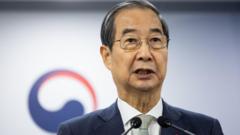Despite efforts to strengthen alliances, partners like South Korea and Israel are distancing themselves from U.S. goals, reflecting complex dynamics in international relations.
**Biden's Global Diplomacy: Allies Turn Against U.S. Values**

**Biden's Global Diplomacy: Allies Turn Against U.S. Values**
The Biden administration faces challenges as key allies act contrary to American principles.
The Biden administration, amid rising global turmoil, has claimed substantial achievements in reinforcing U.S. alliances as it approaches the end of its tenure. President Biden has recently taken pride in his interactions with global leaders and highlighted the unity within groups like the G20 and G7, branding them as pivotal to the world’s leading democracies.
However, this narrative faces scrutiny as key allies, including South Korea and Israel, have engaged in actions that seemingly contradict the core values of democracy, rule of law, and human rights, which President Biden has championed. President Yoon Suk Yeol of South Korea has come under fire after declaring martial law and was later impeached by his legislature, raising alarms about adherence to democratic norms in a country seen historically as a U.S. ally.
At a recent G7 meeting in Rome, Secretary of State Antony J. Blinken remarked on the group's renewed strength and influence. Despite this, the unexpected actions of partner nations have forced the Biden administration to grapple with the reality that not all allies share its commitment to democratic principles. Consequently, the administration is left reflecting on the effectiveness of its foreign policy strategy and the reliability of its allies as the complexities of international relations unfold.
As the Biden administration wraps up its foreign policy endeavors, the diverging interests of its long-time partners are likely to prompt discussions about future U.S. engagement on the global stage, especially as controversies surrounding shared values continue to shape international alliances.
However, this narrative faces scrutiny as key allies, including South Korea and Israel, have engaged in actions that seemingly contradict the core values of democracy, rule of law, and human rights, which President Biden has championed. President Yoon Suk Yeol of South Korea has come under fire after declaring martial law and was later impeached by his legislature, raising alarms about adherence to democratic norms in a country seen historically as a U.S. ally.
At a recent G7 meeting in Rome, Secretary of State Antony J. Blinken remarked on the group's renewed strength and influence. Despite this, the unexpected actions of partner nations have forced the Biden administration to grapple with the reality that not all allies share its commitment to democratic principles. Consequently, the administration is left reflecting on the effectiveness of its foreign policy strategy and the reliability of its allies as the complexities of international relations unfold.
As the Biden administration wraps up its foreign policy endeavors, the diverging interests of its long-time partners are likely to prompt discussions about future U.S. engagement on the global stage, especially as controversies surrounding shared values continue to shape international alliances.






















